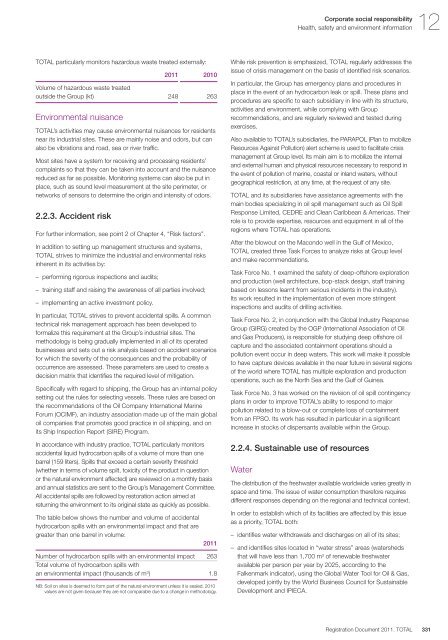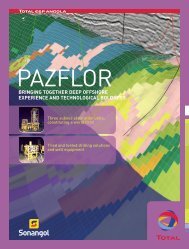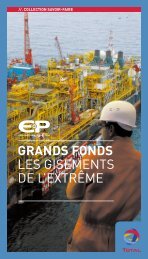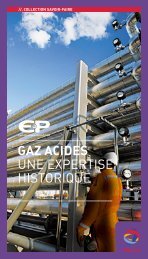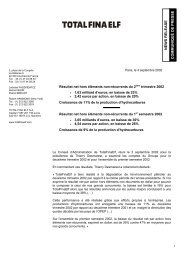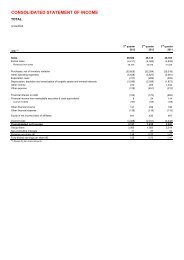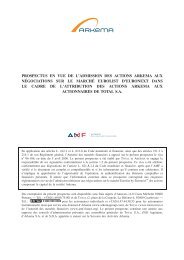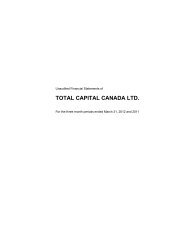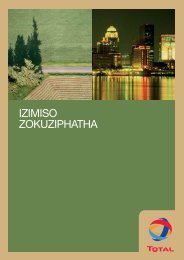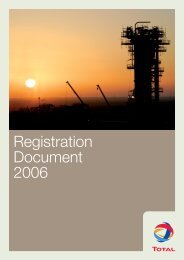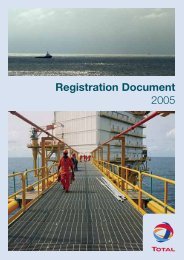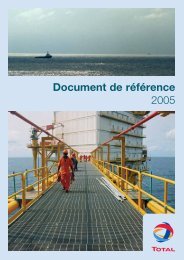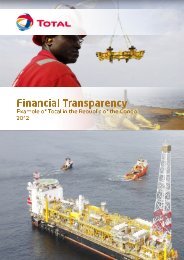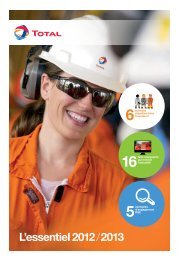Registration document 2011 - tota - Total.com
Registration document 2011 - tota - Total.com
Registration document 2011 - tota - Total.com
Create successful ePaper yourself
Turn your PDF publications into a flip-book with our unique Google optimized e-Paper software.
TOTAL particularly monitors hazardous waste treated externally:<br />
<strong>2011</strong> 2010<br />
Volume of hazardous waste treated<br />
outside the Group (kt) 248 263<br />
Environmental nuisance<br />
TOTAL’s activities may cause environmental nuisances for residents<br />
near its industrial sites. These are mainly noise and odors, but can<br />
also be vibrations and road, sea or river traffic.<br />
Most sites have a system for receiving and processing residents’<br />
<strong>com</strong>plaints so that they can be taken into account and the nuisance<br />
reduced as far as possible. Monitoring systems can also be put in<br />
place, such as sound level measurement at the site perimeter, or<br />
networks of sensors to determine the origin and intensity of odors.<br />
2.2.3. Accident risk<br />
For further information, see point 2 of Chapter 4, “Risk factors”.<br />
In addition to setting up management structures and systems,<br />
TOTAL strives to minimize the industrial and environmental risks<br />
inherent in its activities by:<br />
– performing rigorous inspections and audits;<br />
– training staff and raising the awareness of all parties involved;<br />
– implementing an active investment policy.<br />
In particular, TOTAL strives to prevent accidental spills. A <strong>com</strong>mon<br />
technical risk management approach has been developed to<br />
formalize this requirement at the Group’s industrial sites. The<br />
methodology is being gradually implemented in all of its operated<br />
businesses and sets out a risk analysis based on accident scenarios<br />
for which the severity of the consequences and the probability of<br />
occurrence are assessed. These parameters are used to create a<br />
decision matrix that identifies the required level of mitigation.<br />
Specifically with regard to shipping, the Group has an internal policy<br />
setting out the rules for selecting vessels. These rules are based on<br />
the re<strong>com</strong>mendations of the Oil Company International Marine<br />
Forum (OCIMF), an industry association made up of the main global<br />
oil <strong>com</strong>panies that promotes good practice in oil shipping, and on<br />
its Ship Inspection Report (SIRE) Program.<br />
In accordance with industry practice, TOTAL particularly monitors<br />
accidental liquid hydrocarbon spills of a volume of more than one<br />
barrel (159 liters). Spills that exceed a certain severity threshold<br />
(whether in terms of volume spilt, toxicity of the product in question<br />
or the natural environment affected) are reviewed on a monthly basis<br />
and annual statistics are sent to the Group’s Management Committee.<br />
All accidental spills are followed by restoration action aimed at<br />
returning the environment to its original state as quickly as possible.<br />
The table below shows the number and volume of accidental<br />
hydrocarbon spills with an environmental impact and that are<br />
greater than one barrel in volume:<br />
<strong>2011</strong><br />
Number of hydrocarbon spills with an environmental impact 263<br />
<strong>Total</strong> volume of hydrocarbon spills with<br />
an environmental impact (thousands of m 3 ) 1.8<br />
NB: Soil on sites is deemed to form part of the natural environment unless it is sealed. 2010<br />
values are not given because they are not <strong>com</strong>parable due to a change in methodology.<br />
While risk prevention is emphasized, TOTAL regularly addresses the<br />
issue of crisis management on the basis of identified risk scenarios.<br />
In particular, the Group has emergency plans and procedures in<br />
place in the event of an hydrocarbon leak or spill. These plans and<br />
procedures are specific to each subsidiary in line with its structure,<br />
activities and environment, while <strong>com</strong>plying with Group<br />
re<strong>com</strong>mendations, and are regularly reviewed and tested during<br />
exercises.<br />
Also available to TOTAL’s subsidiaries, the PARAPOL (Plan to mobilize<br />
Resources Against Pollution) alert scheme is used to facilitate crisis<br />
management at Group level. Its main aim is to mobilize the internal<br />
and external human and physical resources necessary to respond in<br />
the event of pollution of marine, coastal or inland waters, without<br />
geographical restriction, at any time, at the request of any site.<br />
TOTAL and its subsidiaries have assistance agreements with the<br />
main bodies specializing in oil spill management such as Oil Spill<br />
Response Limited, CEDRE and Clean Caribbean & Americas. Their<br />
role is to provide expertise, resources and equipment in all of the<br />
regions where TOTAL has operations.<br />
After the blowout on the Macondo well in the Gulf of Mexico,<br />
TOTAL created three Task Forces to analyze risks at Group level<br />
and make re<strong>com</strong>mendations.<br />
Task Force No. 1 examined the safety of deep-offshore exploration<br />
and production (well architecture, bop-stack design, staff training<br />
based on lessons learnt from serious incidents in the industry).<br />
Its work resulted in the implementation of even more stringent<br />
inspections and audits of drilling activities.<br />
Task Force No. 2, in conjunction with the Global Industry Response<br />
Group (GIRG) created by the OGP (International Association of Oil<br />
and Gas Producers), is responsible for studying deep offshore oil<br />
capture and the associated containment operations should a<br />
pollution event occur in deep waters. This work will make it possible<br />
to have capture devices available in the near future in several regions<br />
of the world where TOTAL has multiple exploration and production<br />
operations, such as the North Sea and the Gulf of Guinea.<br />
Task Force No. 3 has worked on the revision of oil spill contingency<br />
plans in order to improve TOTAL’s ability to respond to major<br />
pollution related to a blow-out or <strong>com</strong>plete loss of containment<br />
from an FPSO. Its work has resulted in particular in a significant<br />
increase in stocks of dispersants available within the Group.<br />
2.2.4. Sustainable use of resources<br />
Water<br />
Corporate social responsibility 12<br />
Health, safety and environment information<br />
The distribution of the freshwater available worldwide varies greatly in<br />
space and time. The issue of water consumption therefore requires<br />
different responses depending on the regional and technical context.<br />
In order to establish which of its facilities are affected by this issue<br />
as a priority, TOTAL both:<br />
– identifies water withdrawals and discharges on all of its sites;<br />
– and identifies sites located in “water stress” areas (watersheds<br />
that will have less than 1,700 m 3 of renewable freshwater<br />
available per person per year by 2025, according to the<br />
Falkenmark indicator), using the Global Water Tool for Oil & Gas,<br />
developed jointly by the World Business Council for Sustainable<br />
Development and IPIECA.<br />
<strong>Registration</strong> Document <strong>2011</strong>. TOTAL 331


